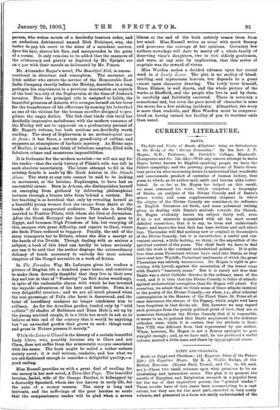CURRENT LITERATURE.
DANTE.
The Life and Works of Dante Allighieri : being an Introduction to the Study of the " Dirina Commedia." By the Rev. J. F. Hogan, D.D., Professor, St. Patrick's College, Itlaynooth. (Longmans and Co. 12s. 6d.)—With any sincere attempt to make Dante better known to English-speaking people we have the fullest sympathy ; and the growing proportions of Dante litera- ture prove an ever-increasing desire to understand that wonderful and consummate product of centuries of human history, that poem to which, as its author said, earth and heaven alike contri- buted. In so far as Dr. Hogan has helped on this result, we must commend his work, which comprises a biography of Dante, an analysis of the Divine Comedy and of Dante's minor works, and some supplementary chapters in which the origins of the Divine Comedy are considered, its influence on English literature set forth, and some polemical writing given us dealing with Dante's attitude towards the Church. Dr. Hogan evidently knows his subject fairly well, even if he is not minutely acquainted with all the most recent detailed researches; that is to say, he loves and understands Dante and knows the best that has been written and said about him. The reader will find nothing new or original in the analysis of the Divine Comedy, but it is nevertheless a useful and con- venient survey, a little lacking, we think, in the exposition of the spiritual content of the poem. The chief fault we have to find with the work is the constant ecclesiastical polemic. It is quite true that some Protestant writers have read into Dante, as they have read into Wycliffe, Protestant sentiments of which the great Florentine was entirely unconscious. Dr. Hogan is right in pro- testing, with Lowell, against the association of the bonnet rouge with Dante's "heavenly muse." But it is surely not true that Dante was a strict Catholic devotee in the ordinary sense of the word, and it is true that the Divine Comedy is fuller of attacks against ecclesiastical corruption than Dr. Hogan will admit. For ourselves, we admit that we think some of these attacks inimical to the poetry of the Divine Comedy,—as when, e.g., after celestial contemplation in the Heaven of the Fixed Stars, St. Peter all at once denounces the abuses of the Papacy, which might well have been forgotten in that divine air. But, however we may regard such passages from the purely political point of view, they are so numerous throughout the Divine Comedy that it is impossible, it seems to us, to pretend that Dante acquiesced in the ordinary orthodox view, while it is certain that his attitude to Boni- face VIII. was different from that represented by our author. When, however, Dr. Hogan is not a Roman apologist lie goes straight enough ; and, as we have said, he has produced a useful volume, marred a little here and there by typographical errors.






































 Previous page
Previous page